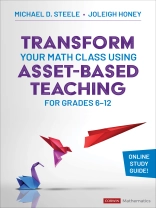Foster a love of mathematics by creating a more inclusive and empowering learning environment through asset-based teaching!
An asset-based perspective on math education means starting with what students already know instead of focusing on what’s missing. This approach elevates student thinking and reasoning skills. In this way, educators acknowledge that all students bring prior experiences, strengths, talents, and resources to the learning process and can contribute meaningfully in an authentic learning environment. Transform Your Math Class Using Asset-Based Teaching for Grades 6-12 provides insight into asset-based perspectives in mathematics education to create an environment where all students feel valued and capable of being doers of mathematics. In the book, Michael Steele and Joleigh Honey highlight the importance of using language, instructional routines, and systemic structure that positively impact student engagement, their math identity, and ultimately their outcomes.
Providing a wealth of knowledge and practical strategies that can be used to transform math classrooms into inclusive, supportive, and empowering learning environments, this book:
- Introduces an asset-based perspective that focuses on students′ strengths, assets, and potential to learn mathematics
- Includes a variety of frameworks and tools that teachers can use to build and grow their sense of asset-based perspectives
- Offers strategies for promoting a growth mindset in mathematics, encouraging productive struggle in math, and promoting equitable math instruction
- Supports teachers in reflecting on their decisions, self-awareness, and self-management
- Includes a companion online study guide to support teachers individually or as part of a professional learning community
Adopting asset-based perspectives is about movement over time, not about flipping a switch. This book paves the path for an asset-based journey that ultimately helps to transform our math classrooms and advance all students’ learning and development.
İçerik tablosu
Preface
Chapter 1: Introduction to an Asset-Based Perspective
Part 1: Asset-Based Language
Chapter 2: Honoring Student Language While Building Meaningful and Mathematically Accurate Content
Chapter 3: Empowering Students through Language
Chapter 4: Unpacking and Evolving Our Language
Part 2: Asset-Based Routines
Chapter 5: What Drives Student-Centered Instruction
Chapter 6: Increasing Student Confidence and Engagement Using Asset-Based Routines
Chapter 7: Lesson Routines that Become Practices
Part 3: Asset-Based Systems
Chapter 8: Structures and Their Impact on Mathematics Learning and Teaching
Chapter 9: Enhancing Larger Systemic Structures through Asset-Based Perspectives
Chapter 10: Leveraging Strengths Across Our Systems to Advocate for Long-Term Change
Epilogue: What Now?
Yazar hakkında
Michael D. Steele is a Professor and Chairperson of the Department of Educational Studies in Teachers College at Ball State University. He is a Past President of the Association of Mathematics Teacher Educators, current director-at-large of the National Council of Teachers of Mathematics, and editor of the journal Mathematics Teacher Educator. A former middle and high school mathematics and science teacher, Dr. Steele has worked with preservice secondary mathematics teachers, practicing teachers, administrators, and doctoral students across the country. He has published several books and research articles focused on supporting mathematics teachers in enacting research-based effective mathematics teaching practices.Dr. Steele’s work focuses on supporting secondary math teachers in developing mathematical knowledge for teaching, integrating content and pedagogy, through teacher preparation and professional development. He is the co-author of NCTM’s Taking Action: Implementing Effective Mathematics Teaching Practice in Grades 6-8. He is a co-author of several research-based professional development volumes, including The 5 Practices in Practice: Successfully Orchestrating Mathematics Discussions in Your High School Classroom, Mathematics Discourse in Secondary Classrooms, and We Reason and Prove for All Mathematics. He directed the NSF-funded Milwaukee Mathematics Teacher Partnership, an initiative focused on microcredential-based teacher professional development and leadership. His research focuses on teacher learning through case-based professional development, and he has been an investigator on several National Science Foundation-funded projects focused on teacher learning and development. He also studies the influence of curriculum and policy in high school mathematics, with a focus on Algebra I policy and practice, and is the author of A Quiet Revolution: One District’s Story of Radical Curricular Change in Mathematics, a resource focused on reforming high school mathematics teaching and learning. He works regularly with districts across the country to design and deploy teacher professional development to strengthen effective secondary teaching practice.Dr. Steele was awarded the inaugural Best Reviewer award for Mathematics Teacher Educator and was author of the 2016 Best Article in Journal of Research in Leadership Education. He is an active member of and regular presenter for the National Council of Teachers of Mathematics, the National Council of Supervisors of Mathematics, and the Association of Mathematics Teacher Educators. He reviews regularly for major mathematics education and teacher education journals.












